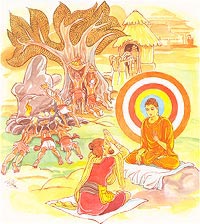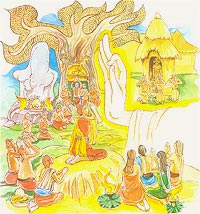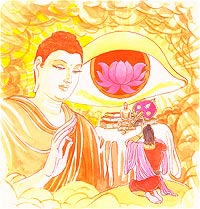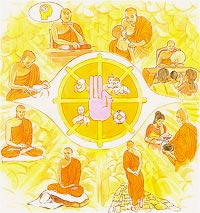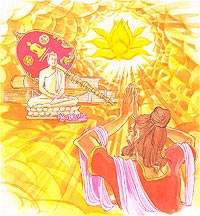Dhammapada Verses 188 to 192
Aggidattabrahmana Vatthu
Bahum ve saranam yanti
pabbatani vanani ca
aramarukkhacetyani
manussa bhayatajjita.
Netam kho saranam khemam
netam saranamuttamam
netam saranamagamma
sabbadukkha pamuccati.
Yo ca buddhanca dhammanca
samghanca saranam gato
cattari ariyasaccani
sammappannaya passati.
Dukkham dukkhasamuppadam
dukkhassa ca atikkamam
ariyam catthangikam maggam
dukkhupasamagaminam.
Etam kho saranam khemam
etam saranamuttamam
etam saranamagamma
sabbadukkha pamuccati.
Verse 188: When threatened with danger, men go to many a refuge, - to
mountains and forests, to parks and gardens, and to sacred trees.
Verse 189: But such a refuge is not a safe refuge, not the best refuge. One
is not liberated from all evil consequences of existence (dukkha) for having
come to such a refuge.
Verses 190 & 191: One, who takes refuge in the Buddha, the Dhamma and the
Samgha, sees with Magga Insight the Four Noble Truths, viz., Dukkha, the Cause
of Dukkha, the Cessation of Dukkha, and the Noble Path of Eight Constituents
which leads to the Cessation of Dukkha.
Verse 192: This, indeed, is the safe refuge; this is the best refuge. Having
come to this refuge, one is liberated from all dukkha.
The Story of Aggidatta
While residing at the Jetavana monastery, the Buddha uttered Verses (188) to
(192) of this book, with reference to Aggidatta, a brahmin.
Aggidatta was the head priest during the time of King Mahakosala, father of
King Pasenadi. After the death of King Mahakosala, Aggidatta gave away his
property in charity, and after that he left his home and became a non-Buddhist
ascetic. He lived with his ten thousand followers in a place near the border of
the three kingdoms of Anga, Magadha and Kuru, not far from a mound of sand where
a powerful naga was staying. To his followers and the people of these three
kingdoms, Aggidatta used to exhort: “Pay homage to forests, mountains,
parks and gardens, and trees; by doing so, you will be liberated from all ills
of life.”
One day, the Buddha saw Aggidatta and his followers in his vision and
realized that the time was ripe for them to attain arahatship. So the Buddha
sent Thera Maha Moggalana to Aggidatta and his followers and told him that he
himself would follow afterwards. Thera Maha Moggalana went to the place of
Aggidatta and his followers and asked them to give him shelter for one night.
They first turned down his request, but finally they agreed to let him stop at
the mound of sand, the home of the naga. The naga was very antagonistic to Thera
Maha Moggalana, and there followed a duel between the naga and the thera; on
both sides, there was a display of power by emitting smoke and flames. However,
in the end, the naga was subdued. He coiled himself round the mound of sand, and
raised his head spreading it out like an umbrella over Thera Maha Moggalana,
thus showing respect for him. Early in the morning, Aggidatta and the other
ascetics came to the mound of sand to find out whether Thera Maha Moggalana was
still alive; they had expected to see him dead. When they found the naga tamed,
and meekly holding his head like an umbrella over Thera Maha Moggalana, they
were very much astounded.
Just then, the Buddha arrived and Thera Maha Moggallana got up from his seat
on the mound and paid obeisance to the Buddha. Thera Maha Moggalana then
proclaimed to the audience of ascetics, “This is my Teacher, the supreme
Buddha, and I am but a humble pupil of this great Teacher!” Hearing him,
the ascetics who had been very much impressed even by the power of Thera Maha
Moggalana were awed by the greater power of the Buddha. The Buddha then asked
Aggidatta what he taught his followers and the residents of the neighbourhood.
Aggidatta replied that he had taught them to pay homage to mountains, forests,
parks and gardens, and trees, and that by doing so, they would be liberated from
all ills of life. The Buddha’s reply to Aggidatta was, “Aggidatta,
people go to mountains, forests, gardens and parks, and trees for refuge when
they are threatened with danger, but these things cannot offer them any
protection. Only those who take refuge in the Buddha, the Dhamma and the Samgha
are liberated from the round of rebirths (samsara)”.
Then the Buddha spoke in verse as follows:
|
Verse 188: When threatened with danger, men go to
many a refuge, - to mountains and forests, to parks and gardens, and
to sacred trees.
|
| |
|
Verse 189: But such a refuge is not a safe refuge,
not the best refuge. One is not liberated from all evil consequences
of existence (dukkha) for having come to such a refuge.
|
| |
|
Verses 190 & 191: One, who takes refuge in the
Buddha, the Dhamma and the Samgha, sees with Magga Insight the Four
Noble Truths, viz., Dukkha, the Cause of Dukkha, the Cessation of
Dukkha, and the Noble Path of Eight Constituents which leads to the
Cessation of Dukkha.
|
| |
|
Verse 192: This, indeed, is the safe refuge; this
is the best refuge. Having come to this refuge, one is liberated from
all dukkha.
|
At the end of the discourse Aggidatta and all his followers attained
arahatship. All of them entered the Order of the bhikkhus. On that day, when the
disciples of Aggidatta from Anga, Magadha and Kuru came to pay respect to him,
they saw their teacher and his followers garbed as bhikkhus and they were
puzzled and wondered, “Who is the more powerful? Our teacher or Samana
Gotama? Our teacher must be more powerful because Samana Gotama has come to our
teacher.” The Buddha knew what they were thinking; Aggidatta also felt that
he must set their minds at rest. So, he paid obeisance to the Buddha in the
presence of his disciples, and said, “Venerable Sir! You are my teacher, I
am but a disciple of yours.” Thus, the audience came to realize the
supremacy of the Buddha.
